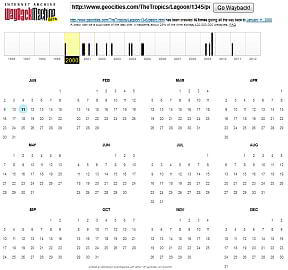Increasing numbers of links point to web pages, servers or other resources that have become permanently unavailable. The phrase also describes the effects of failing to update out-of-date web pages that clutter search engine results. A link that does not work any more is called a broken link, dead link or dangling link.
A link may become broken for several reasons: The most common result of a dead link is a 404 error, which indicates that the web server responded, but the specific page could not be found.
Today everyone knows how to use a search engine. You have Google, Bing, Yahoo, AltaVista, Excite, Hot Bot, you can use specialized search engines like US Patent search, the USGS… well the list goes on and on.
After receiving a page of results, or even reading info on someone’s site, you might find an interesting link to follow, only to be told the page is no longer available?
For instance, most ANY link from GeoCities is no longer available. GeoCities was originally founded by David Bohnett and John Rezner in late 1994 as the Beverly Hills Internet (BHI). After Yahoo bought GeoCities, the company soon shut down the United States GeoCities service, and GeoCities websites eventually became unavailable. There were more than 35 million user-built pages before it was removed from mainstream Internet availability in late 2009! Is all that information lost? Some can still be found since many authors came back in other ways, but it would seem that many a page just disappeared into cyberspace!
Here is an example. Someone I know was hunting spooks, anyway a web page he had been reading referenced this link; www.geocities.com/TheTropics/Lagoon/1345/pedro.html. When he clicked on it he received this message;
Sorry, the GeoCities web site you were trying to reach is no longer available. GeoCities has closed, but there’s a lot more to explore on Yahoo!
Human’s have always had a method of archiving history. From hieroglyphics to the Dead Sea Scrolls, time capsules and libraries full of history books. How about the Internet. Day after day intelligent people world wide are writing blogs and creating websites for specialized topics. I’m sure there have been a few links off line while you have read thus far.
Libraries exist to preserve society’s cultural artifacts and provide us access to them. If libraries are to continue to foster education and scholarship in this era of digital technology, it’s essential for them to extend those functions into today’s digital world.
Back to my friend’s dilemma… He ran across a few more expired links and he asked me if something was wrong. I showed him how to copy the link to Windows clipboard, then paste it in a unique search engine, The WayBackMachine! Have you ever heard of the “WayBackMachine”? Cleaver name huh? You can find a vast amount of information which is currently “Expired” using this tool.

So we went there, and found the first archived copy of this page dating back to January, 11 2000;
http://web.archive.org/web/20000111074031/http://www.geocities.com/TheTropics/Lagoon/1345/pedro.html.
When we received the results for his search we didn’t just get this link. Take a look at what we saw;
Notice the timeline at the top of the page. Here are all the snapshots that are available for this one link. After choosing a year from the timeline the calendar changes and gives you little highlights on the day’s where there is a “snapshot” available.
You’ll find much more than just The WayBackMachine when you visit www.archive.org. Upon arrival you can find 605,141 movies to browse by keyword in “Moving Images”, 96,890 concerts to browse by Artist in “Live Music Archive”, 1,131,071 recordings to browse by keyword in “Audio” and 3,174,499 texts to browse by keyword in “Texts”. These collections are growing rapidly, it’s free and easy to use, registration is free and you can visit the blog and Discussions.
Click above and visit this fascinating site!

